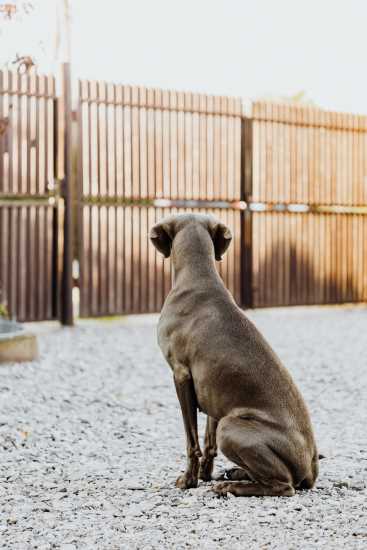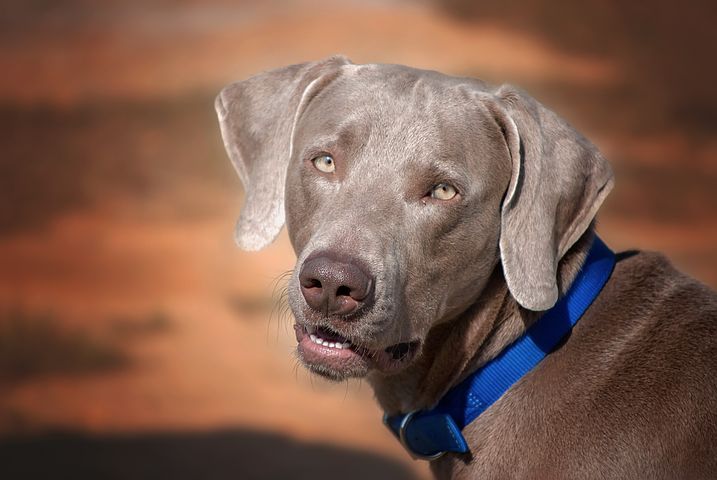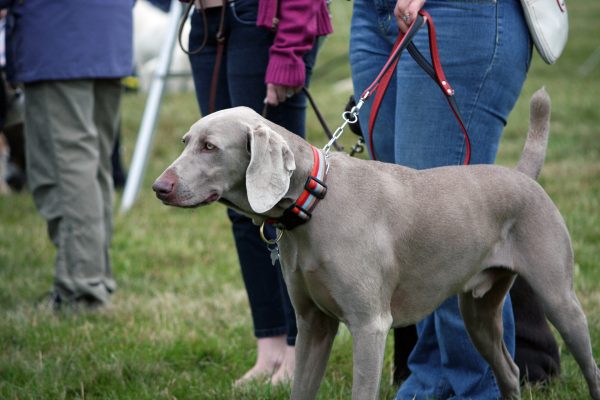While we’ve come to expect dog incontinence in young puppies until they get good control, older dogs can also become incontinent as they age
In fact, actual incontinence is more common in older dogs than younger dogs. This is because older dogs often get diseases and conditions that cause them to lose control.
For example, did you know that a urinary tract infection or UTI can cause your Weimaraner to lose control of his urine. Or a bladder infection with or without bladder stones.
Perhaps your dog, young or old, has diabetes. When a dog has a hormonal imbalance like diabetes, he has a number of different side effects, including inability to control his urine.
The Weimaraner dog breed is more prone to some dog urinary issues than other dogs. Knowing what to look for, will help you control the problem.

Dog Incontinence at Any Age
Urinary incontinence is simply the leaking of urine when the dog cannot control it. When this happens, dog owners understandably get frustrated with their dog. Incontinence is one of the reasons that dogs end up in a Rescue.
Before you punish your dog for peeing on the floor, consider these medical reasons that she could lose control of her bladder.
Cystitis
Cystitis is another name for a urinary tract infection. Your dog may strain to pee. She may need to go outside more frequently. And she may have blood in her urine.
You can perform a simple test at home to see if your dog has a UTI and you’ll have the results in two minutes.
If you find that your dog has a urinary tract infection, Mighty Max Cranberry and Probiotics chews will cure the infection and prevent a recurrence.
Sphincter Incompetence
The sphincter is the muscle that controls the flow of urine out of the bladder. When it can’t completely tighten to hold the urine, your dog has sphincter incompetence.
Leaking usually happens when your dog is lying down or asleep. Older female Weimaraner dogs are most prone to this condition. It is treated with female hormones or with a prescription drug call PPA (phenylpropanolomine).
Bladder Stones
If your dog has urinary tract stones, she will have the same symptoms as a urinary tract infection. Bladder stones can also cause a bacterial infection. Stones can form in the kidneys, as well.
If your dog has kidney or bladder stones, he will need to see the vet. Your dog may have to have the stones removed surgically.
Diabetes
If your dog has diabetes, he may have a problem with urinary incontinence.
Kidney Disease
Kidney disease sometimes causes leaking urine.
Older Dog Incontinence
If your dog is middle-aged or older, incontinence can be temporary, or it can be permanent. The most common causes of dog incontinence in geriatric dogs are:
- Simple urinary tract infection – this can usually be treated with an antibiotic.
- Spinal cord injury
- Urethral obstruction – a growth or other obstruction in the urethral tube
- Bladder stones
Urinary incontinence is most frequent in dogs weighing over 40 pounds. Weimaraners are one of the breeds that are prone to dog incontinence.
Frequently mistaken for submissive urination, canine incontinence is not a behavioral problem, and it needs to be addressed medically.
Your older dog doesn’t even know that she lost her urine. Don’t reprimand her for losing urine. Punishing a geriatric dog that has lost bladder control–will do only harm. It will not resolve the issue!
Older spayed females often lose muscle tone, due to fewer female hormones. Your vet can help you with this, as there is medication that she can prescribe.
If your dog has started to leak urine, take him for more frequent walks. And consider purchasing a dog bed with a washable cover. You can wash it every day and keep your dog’s area smelling fresh and clean.
You can also give your dog a supplement developed for older dogs to help them control their bladders.
Symptoms of Dog Incontinence
Here are some things to look for:
- Puddles on the floor
- Dog odor – Your dog may have an offensive odor because her hair has been soaked with urine around her bottom.
- Urine wetness – Your dog may have obvious wetness from urine. If the skin is always wet from urine, skin irritation can develop.
- Her dog bed is wet or damp – Dogs who are incontinent often lose urine while resting or sleeping. You may notice an odor or dampness on your dog’s bed or where she rests or sleeps.
- Increased thirst – If your dog is drinking LOTS of water, he may have an endocrine disorder, like diabetes.
- Straining to urinate
- Inability to urinate or only able to pee small amounts
- Urinary tract infections – dogs with incontinence often suffer from frequent infections.
Depending on your dog, his age, and the reasons for his incontinence, the treatment may be simple or you may need the assistance of your veterinarian.
There are many good incontinence products on the market to help you keep damage to your home and your dog’s discomfort to a minimum, so don’t despair.
Urinary incontinence can be caused by a simple urinary tract infection (that will go away), by aging in seniors, or by a serious condition like a tumor.
So, before you undergo self treatment for your dog, make sure that you understand the cause of your pet’s incontinence–so that the treatment is appropriate!
Weimaraner Puppies and Incontinence
If your Weimaraner is a puppy and has had a few accidents, you probably don’t have to get too excited about it.
Your puppy probably just needs a little more attention and a few more lessons on potty training.
Puppies cannot hold their urine as long as an adult dog can, so make sure that your puppy goes outside regularly (the same time every day) and frequently.
And give your puppy lots of praise when she urinates outside.
In most cases, puppies will soon be fully trained, and your dog will gain better bladder control, for longer periods of time.
Medications for Dog Incontinence
There are various medications and dog incontinence products that are presently being used to treat canine urinary incontinence.
The most frequently used drug for treating bladder control loss in male dogs is phenylpropanolamine or PPA. This works to tighten the bladder muscles.
If PPA is unavailable, you may also try a synthetic form of estrogen called diethylstilbestrol or DES.
Imipramine may also be used a substitute for treating this medical problem. It is an antidepressant that causes urine retention in some patients treated with it.
Pseudoephedine has also similar effects with that of phenylpropanolamine but is not widely used.






Leave a Reply